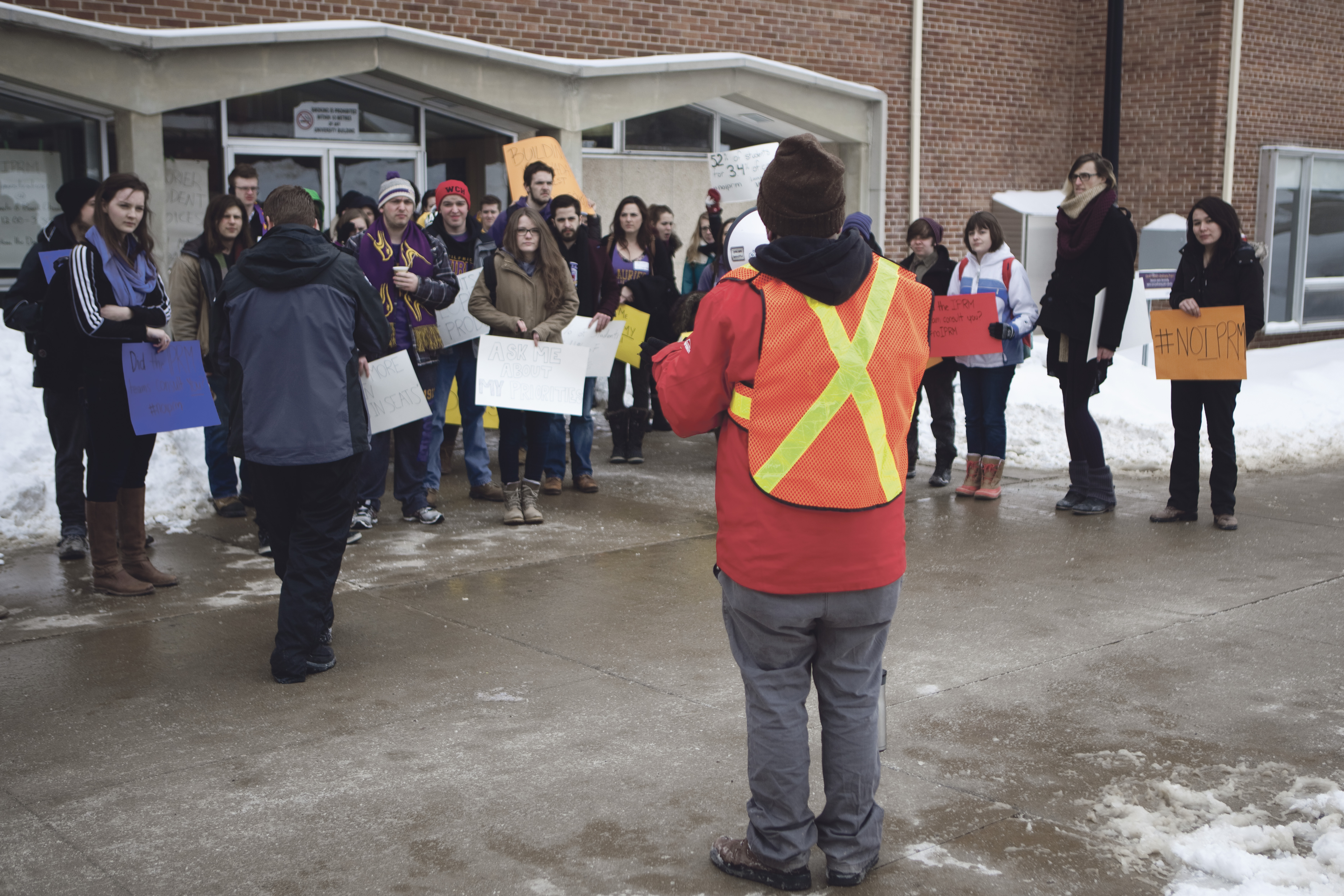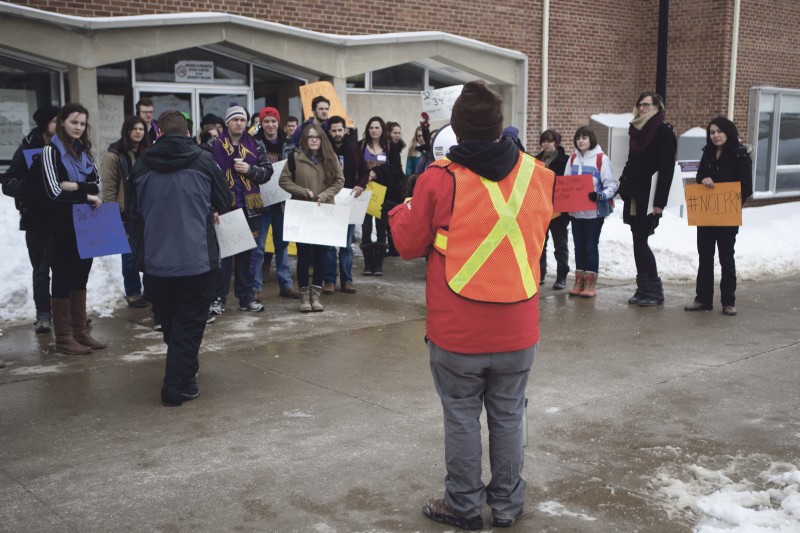Students, profs get heated at board meeting

Sparks fly as IPRM report passes

The Wilfrid Laurier University board of governors approved all motions regarding recommendations of the Integrated Planning and Resource Management report Thursday afternoon, but not without controversy.
Concerns at the special meeting, which included a 2.5-hour discussion at the beginning regarding the IPRM report, came from both faculty and students about the overall process.
Students from the group Laurier Student Voices held a silent protest before the meeting, holding signs with sayings such as “Ask me about my priorities” and “Building Canada’s best business school” with school crossed out. Student representatives, including Connor Young and Ethan Jackson, then spoke up to discuss their concerns with the board.
Faculty members also spoke up about programs being cut and the validity of the process.
Peter Eglin, professor of sociology and voting faculty member on the board, urged his fellow members not to be “naive” about the process.
“It was discouraging for us because … as soon as we looked around the room, we knew it was going to pass,” Young said. “Most of the board of governors are people who are coming from high, corporate positions. They’re businessmen. So of course they are going to be voting in favour of turning the university into what they know best — a business.”
Kim Morouney, co-chair of the planning task force, said she expected a bigger opposition present at the meeting to the report.
“I thought that the people there represented fairly what their conception of IPRM was,” she said. “I thought there was still a lot of misinformation out there that I tried to address [at the beginning] but I still feel that many of the people who were there to oppose IPRM left without having a corrected idea of some of the misconceptions that were problematic at the end of the whole process.”
One of the main issues presented by a few board members, faculty representatives and students was the data collection. Morouney agreed that the data collection was “messy” and at times not straightforward and tried to address it at the beginning of her presentation. However, this continued to be one of the concerns by many of those who spoke to the board throughout the meeting.
Jason Neelis is an associate professor of religion and culture and the graduate coordinator and director of the Laurier/University of Waterloo joint PhD program in religion diversity in North America. He said he found it useful that Morouney acknowledged the flaws with the process.
“If the task force co-chair is admitting there are flaws and errors in the document and that document is supposed to be a basis for decisions, then it is a flawed document that needs to be corrected,” he said.
Morouney said that people were given “ample opportunity” to have their concerns addressed with the data, and if they really disagreed with the way the numbers were calculated, they could help correct them.
“I don’t understand people saying afterwards, ‘The process was flawed because the process was flawed.’ You had every opportunity to correct the numbers if they were, in fact, flawed. So I don’t accept that as a reason for discrediting the process.”
Young touched on the moments throughout the meeting when the chair of the board, Jamie Martin, began cutting off members of the gallery when they began speaking about issues with the results.
“So when we point out issues with the results, that’s saying the process is flawed. But they wouldn’t look at that.”
Neelis said many of the programs that were recommended for “phase out or minimize” in the report were smaller, “niche” programs, including the joint PhD program he directs.
Neelis’ concern was that one of the primary criteria for assessing the strength of the programs was “almost purely in terms of number of students.”
“These programs that were targeted tended to be very small, niche programs that don’t cost the university much, but is unlikely to save the university much at all and the university may end up losing money.”
Morouney acknowledged the quality of these smaller programs and said that it comes down to making sure students get the most out of their degrees and ensuring students can access all courses needed for those respective degrees.
“We can have some very high-quality programs that have very low numbers of students,” she said. “[But] we shouldn’t be promising students something that it’s very hard to deliver on.”
Matt McLean, chair of the Wilfrid Laurier University Students’ Union board, was the Waterloo student representative on the administrative priorities team. He said while he understands the concerns from students, there was not much involvement from students in the first two years.
“From my standpoint, and from that of the Students’ Union, the process of IPRM is extremely democratic. There were a lot of opportunities for people to get involved and voice their concerns,” he said. “It’s just very frustrating having put so much time into the process that people are now saying they were largely unaware and that it was unfairly marketed to them.”
“I think people should give this process more credit than they are,” McLean continued.
At the board meeting there was no representation from the Students’ Union. McLean said this is probably due to time conflicts and that having representation at these meetings is more “symbolic” than affective for tangible change.
“Anything we do is not going to change the process at this point,” he said.
McLean explained that the Students’ Union supported the IPRM process from the beginning over two years ago.
“As an organization, we supported the process because it was a way for senior admin to keep their hands out of the big, high-level decisions.”
TJ Edmondson, the student representative on the board of governors, approved all four motions regarding the recommendations at Thursday’s meeting. Young said he did not contact Edmondson beforehand, but that his demeanour in the meeting was discouraging.
“I don’t want to make any personal attacks, but TJ did not look interested in what was being said.”
Edmondson was contacted by The Cord for an interview, but did not respond.
Young said this “isn’t the end” for Laurier Student Voices. They will be taking a “critical view” on how the university begins to implement these changes and will be talking to their decanal administration about their concerns.
“It is not a good way to inspire collaboration and partnership. It’s a great way to divide the university and that’s exactly what it did,” he said.
The IPRM recommendations will now go back to each respective council and group to see how they can be implemented. The leaders will look at the data in the report as well as new, current data and see what will be best for each program and service.
Morouney said there is no solid timeline for how long the individual groups could take to figure out how to implement these changes, and that it’s largely up to the programs as to what will happen next.


